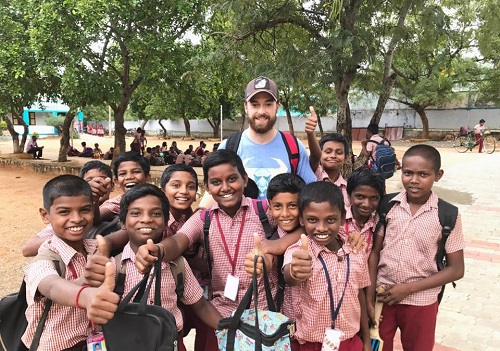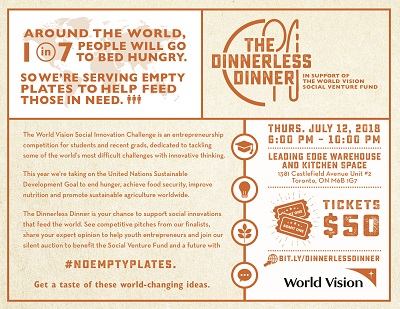On July 12, World Vision will be holding its third annual Social Innovation Challenge, an entrepreneurship competition for students and recent grads, dedicated to tackling some of the world’s most difficult challenges with innovative thinking. Titled The Dinnerless Dinner, this year’s event is taking on the United Nations Sustainable Development Goal to end hunger, achieve food security, improve nutrition and promote sustainable agriculture worldwide.
SEE Change sat down with Josh Folkema, founder of World Vision’s Impact Investing Fund and creator of the Challenge to ask him about what inspired this annual event, the impact it’s had so far, the landscape of impact investing in Canada and the role of World Vision in moving it forward.
Taurus 3D, 2016 Social Innovation Challenge Winner, committed to making 3D prosthetics low-cost and available for communities in need
When did you start the World Vision Social Innovation Challenge and why?
We had originally started incubating social enterprises inside the organization for some time but, progressively, I had noticed that we don’t have the time or talent to develop these ideas into businesses. At the same time, I was recognizing that there was amazing work done by social entrepreneurs, but they lacked context on development problems, market access and to some extent capital.
I thought we should try and support these entrepreneurs but help frame the problem better and provide more context. So we launched the Social Innovation Challenge which targets university teams to build social enterprise ideas to [tackle] some of the challenges facing the most vulnerable people around the world.
How long has the challenge been running?
We are currently on our third challenge. The first was on water, sanitation and health, the second was on energy poverty and this one is on food security and nutrition.
What are some of the innovative ideas that have come out of the World Vision Social Innovation Challenge?
The first prize went to a team, Taurus 3D, out of Guelph University, that made use of 3D printing to print more affordable prosthetics for people without out limbs in India. Last year the grand prize went to a team from McGill University that developed a prototype that would compress agriculture waste into a brick for burning in a fuel-efficient stove.
The second prize went to a high school team from Victoria Park in Toronto, EmpowerEQ, that developed a rotating device that would sit inside a hippo roller (water collector) so that while women were collecting water they could also generate energy which they could take out of the roller and then use to power lights or other small devices in the house.
Where are those teams now?
Taurus 3D is continuing to work with partners in India to test this out. The Lumbrick team is spread out a bit, with some working in Toronto and others finishing their masters in France at the moment. But they continue to be active in development of their business. Their prototype was tested in Cameroon but they had some setbacks and are now working on a joint venture in Kenya. They have also won regionals recently at the Hult prize.
EmpowerEQ are all working to decide what university they go to at the moment but have just returned from testing their prototype in Malawi. They are working on some redesigns at the moment to see what other applications they can apply this to.
What do you see as the future for Canadian Social Innovation?
I see incredible growth in innovation in Canada. We hit above our weight class in terms of what we produce, and I see that growing. In terms of the social aspects of innovation it is growing but needs more support and that young entrepreneurs can make a career of doing good.
How do you see World Vision Canada participating in that space?
We effectively act as a market maker, providing entrepreneurs with the markets that they can’t access or necessarily understand and providing local communities with opportunities to gain access to knew knowledge and technology that otherwise wouldn’t be accessible to them.
Ultimately, we want to see that business can be built for a social good and we can act as a guide post to figure out how to do this while still earning a profit. We also have a Social Venture Fund that looks to invest into new ideas that are further developed. At some point we hope that these ideas develop enough to be investment ready.
Do you have any advice for any young entrepreneurs that may be thinking about building their own social enterprise and applying to the competition next year?
Of course, it is important to understand all the basics of building a new business, do you know your customer, their pain points, how to build a product that meets these and that they are willing to pay for. In the context of social, though, there is a real need to real understand the context better.
Whether it be homeless in Canada or malnutrition in Sudan, without truly understanding this you can’t actually develop a solid product that people are willing to buy. But more than anything we look for the right people and passion to be committed to delivering a viable product a business.


